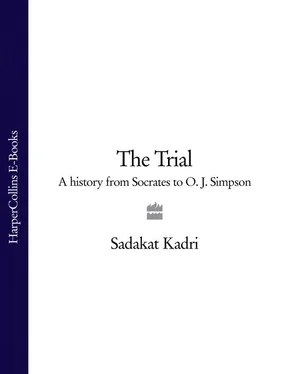There is little doubt, however, that the capital charges against Socrates, though framed in moral and religious terms to get round the amnesty for political offences, were effectively ones of treason. Although Plato chose not to record the speeches of the three accusers, the allegation was that he had lent aid and comfort to Athens’ enemies at a time of war.
Plato’s account of Socrates’ trial portrays the older man as a model of integrity, as determined to expose the weaknesses of the case against him as he was resolute not to save himself through flattery. In his record, the snowy-curled philosopher, standing before 501 fellow citizens, began with the traditionally disingenuous plea of the seasoned orator – an apology for his inarticulacy – before launching into a speech that honoured nothing but the truth. He opened by telling his listeners that the oracle of Apollo at Delphi – the source of wisdom visited by, among others, Orestes in the Oresteia – had identified him as the wisest person alive. Although initially puzzled, he had come to realize why – for he more than anyone else appreciated the limits of his own knowledge. The charges against him were however nonsense. They accused him of teaching young people to believe in new gods, and he had never done that. It was true that a spirit whispered in his ear, but it was a travesty to call that spirit a god. Its voice simply told him to speak plainly and ask awkward questions, and although such behaviour had made him unpopular, he would not stop even if acquitted. He was like a horsefly on the lazy beast of Athens. His judges would spare him if they were sensible, but he suspected that they would sleepily swat him down instead.
Despite the uncertainty over what Socrates taught, it has always been known how he taught it – essentially by prodding his listeners to conclusions that theoretically represented truths that they already knew – and there can be no better demonstration of the technique than the performance recorded by Plato. Some people find the speech moving, while others consider it the preaching of a prig; but whatever the best way to characterize Socrates’ defiance (and Xenophon claims that he simply wanted to die) it won him few friends. He inspired such hostility that he had to ask for silence several times, and although shouting, clapping and booing were common at Athenian trials, when the judges voted, by dropping pebbles into earthenware jars, about 280 of the 501 were for conviction.
Athenian law required that Socrates propose his own sentence, but his response to conviction was to become even less conciliatory. Xenophon recorded that he refused to suggest anything. Plato has him telling the judges that what he most deserved was maintenance at state expense for the rest of his life, dismissing exile with the explanation that the judges were too likely to impose it if he proposed it, and finally condescending to pay a derisory fine. The old man’s supporters swiftly multiplied his offer thirtyfold, but the damage was done. When the ballots were counted, at least eighty of those who had supported his acquittal were now voting for his death. Still Socrates remained undaunted. He would not weep or wail to save himself. He looked forward to meeting the immortals. ‘Now it is time that we were going, I to die and you to live,’ he concluded. ‘Which of us has the happier prospect is unknown to anyone but God.’
Plato’s record, for all its bias, must be largely accurate – not least because his contemporaries would otherwise have written spirited corrections – but Socrates was not condemned simply because he was too honest to deny his genius. The city had just imploded after the most bitter war in its history, eviscerated by a Sparta that he idealized, and those judging him would almost all have been touched by the brutality of the Thirty. When he claimed exalted insights and spoke of a spirit that whispered into his ear, they would have recalled that his wisdom had been taught to traitors. To many of those who heard him, he was neither a harmless crank, nor a seeker after truth. He was an accessory to mass murder.
But the conflict between Socrates and the state would have an unexpected ending. After spending a month in his condemned cell, considerably more jolly than his morose acolytes, he was visited by a pupil called Crito who told him that an escape had been organized. Socrates, however, refused to countenance the idea. He had voluntarily attended his trial instead of exiling himself, he reminded his old friend, and he invited him to contemplate what the laws of Athens would think about the proposal if they were able to speak. As far as Socrates was concerned, they would be horrified. ‘Do you imagine that a city can continue to exist and not be turned upside down,’ they would ask, ‘if the legal judgments which are pronounced in it have no force but are nullified and destroyed by private persons?’ Socrates owed it to the city to stay. It was only through its laws that his parents had been able to marry each other and that he and his children had received their education. He had no more right to undermine an Athenian law that was being wrongly enforced than he would have had to retaliate against his father or his employer.
The willingness to yield to judgment after so steadfast a defence was remarkable enough, but Socrates would now bow even lower. For he did not simply submit to punishment – he carried it out. Athenian law allowed some capital offenders to purchase poison from the state, and Socrates did so. Plato records that he drained his glass in one gulp while disciples wept uncontrollably, and took his leave of life by asking Crito to sacrifice a cock to the god of healing. The pain was over. ‘Such…was the end of our comrade,’ observed Plato, ‘the bravest…wisest and most upright man [of our time].’
As such remarks incessantly remind the reader, Plato was writing in large part to tell Athenians that their verdict had been an awful mistake, but the significance of his account can hardly be overstated. The arguments that he put into Socrates’ mouth, idealizing the law while condemning those who misapplied it, would reverberate down the centuries. They would give birth to the notion that rules can be trusted even when humans cannot, inspiring ideals like the rule of law and the notion that some rights are inalienable. They would have a darker side, underpinning the authoritarian vision of a state that knows best and civil liberties that are always contingent. The record also showed, for the first time, how trials can enforce judgment by turning defendants against themselves. It was a development that would be seen time and again, whenever communal values and political institutions grew sufficiently strong to harness the force of the individual conscience. Its significance was summarized by Sigmund Freud in an image that bears repetition, even if the psychoanalytical theories underlying it might not. ‘Civilization,’ he wrote, ‘obtains mastery over the individual’s dangerous desire for aggression by weakening and disarming it and by setting up an agency within him to watch over it, like a garrison in a conquered city.’
The conventional bridge from Athens to the modern world is the civilization that conquered Greece in 200 BC – Rome. By then, the Republic had a legal culture that was already some three centuries old and its jurists were on the way to developing complex rules of contractual and property law, but its notions of criminal justice would never become quite as sophisticated. Spectacular treason and conspiracy trials would punctuate Roman history, but they were as political as they were principled: an opportunity for ambitious Romans to rally their supporters, display their power or publicly turn the tables on their rivals through a successful prosecution or defence. As in Athens, citizens facing a capital charge had the choice of departure or submission – required either to exile themselves, or attend court unwashed, unshaven, and in shabby mourning dress – but such ritualism rarely stretched to soldiers and never touched the cases of slaves. Roman law had originated in priestly mysteries just as holy as those of any other culture, but justice in the empire was a tool rather than an ideal, wielded by magistrates whose role was to police an empire rather than to honour a tradition.
Читать дальше




![Theresa Cheung - The Dream Dictionary from A to Z [Revised edition] - The Ultimate A–Z to Interpret the Secrets of Your Dreams](/books/692092/theresa-cheung-the-dream-dictionary-from-a-to-z-r-thumb.webp)







